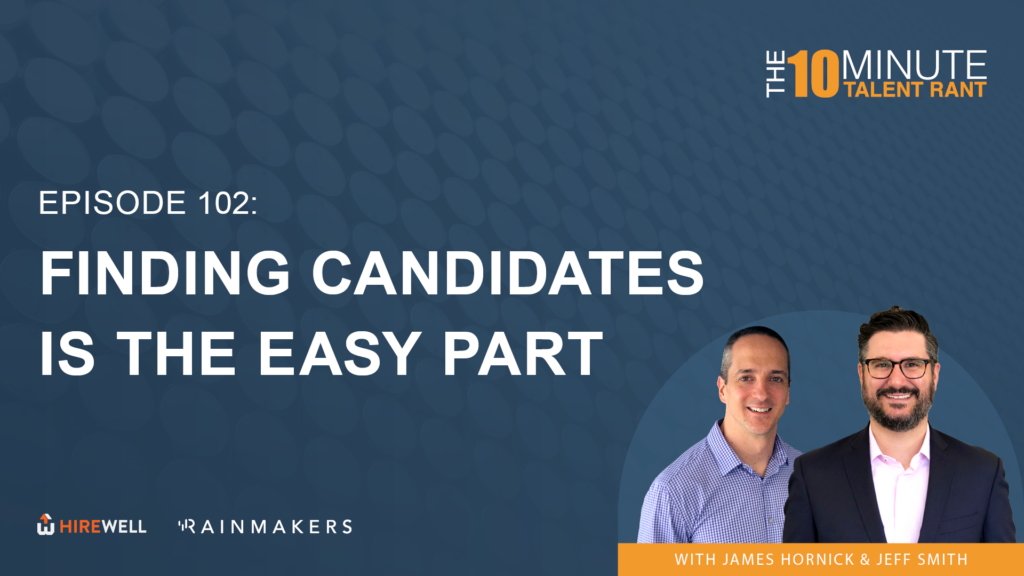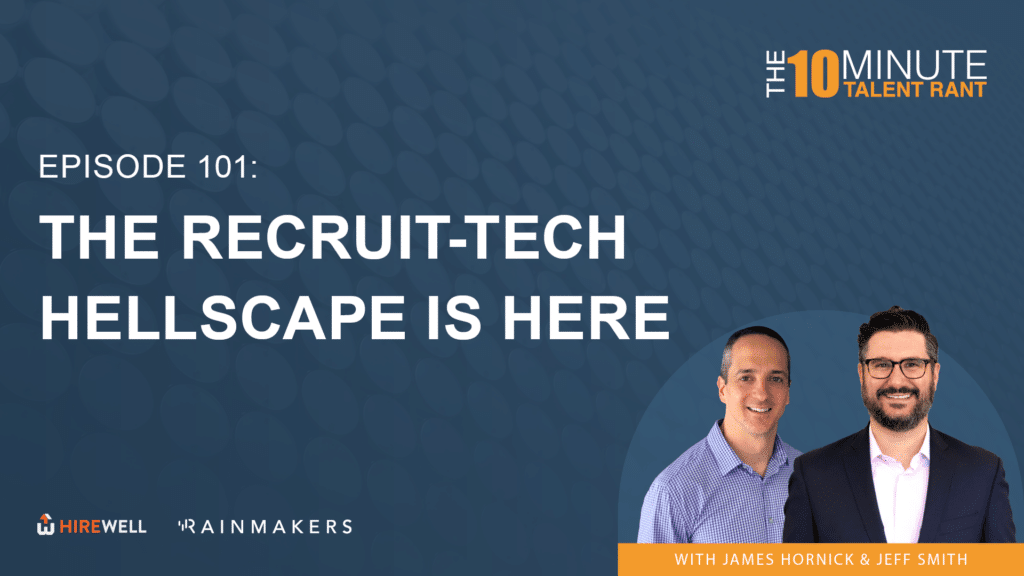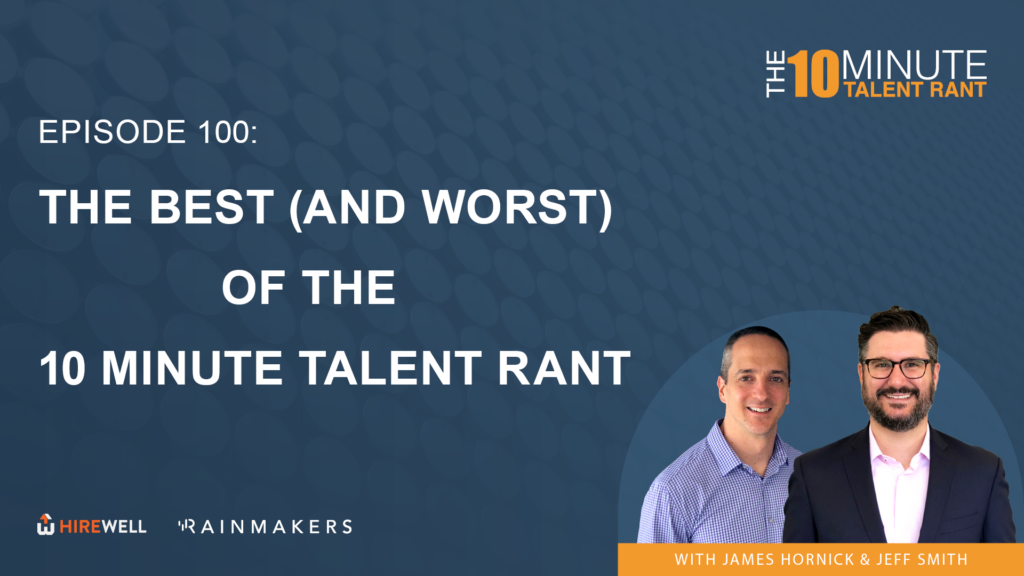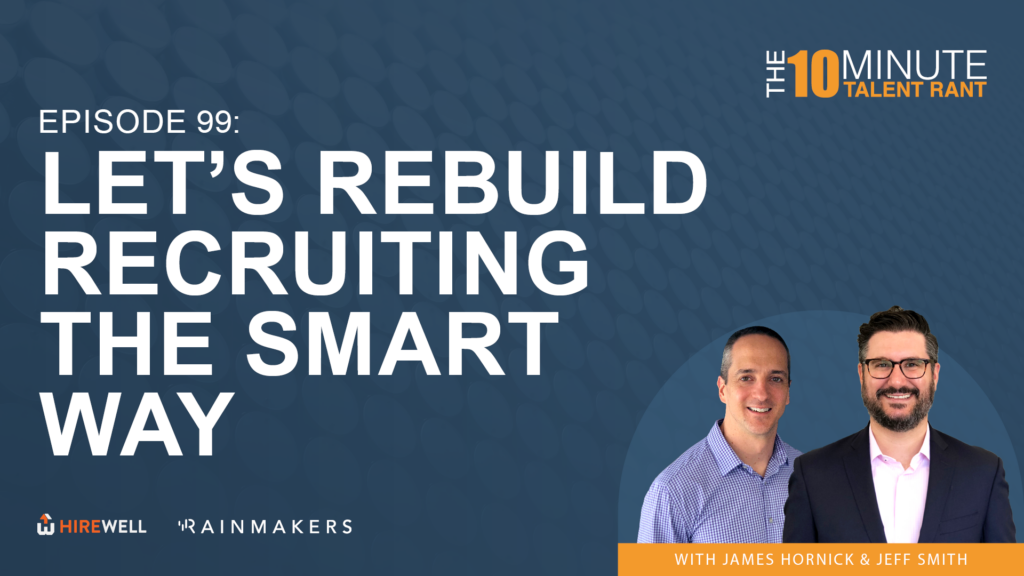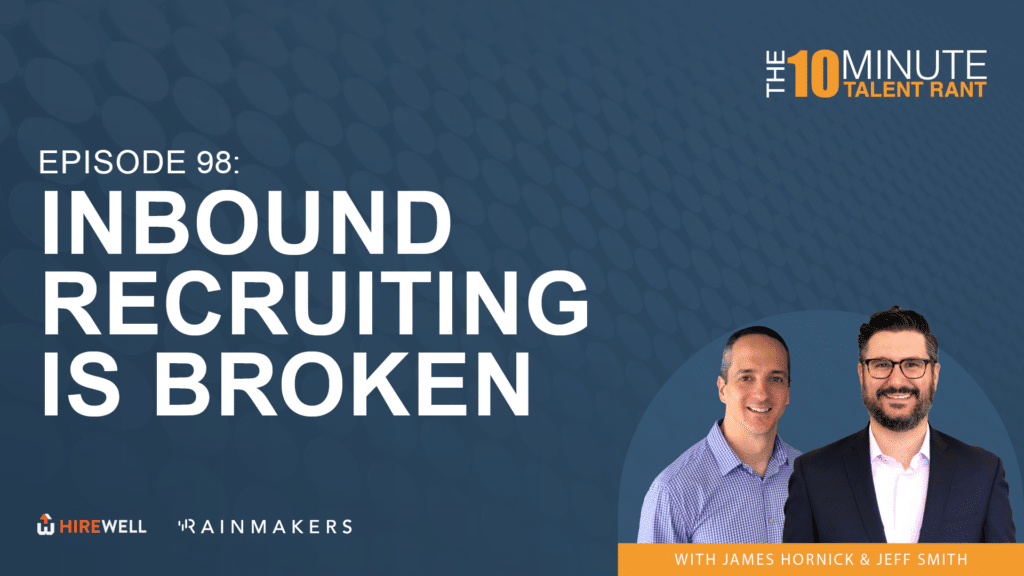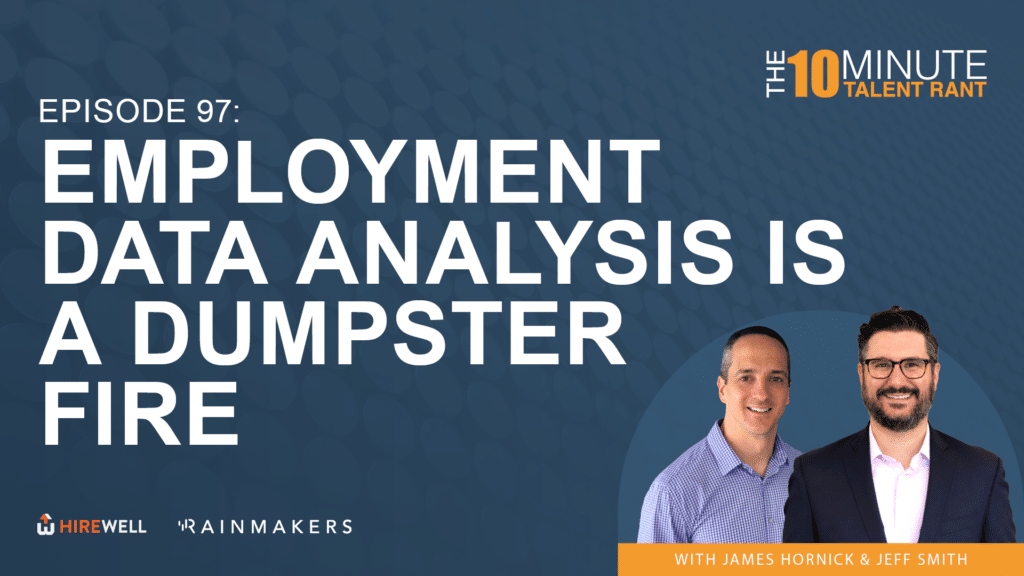The 10 minute talent rant is live. I’m James Hornick joined by Jeff Smith and we are on the clock. The 10 minute talent rant is our ongoing series, where we break down things that are broken in the talent acquisition, hiring space, maybe even pitch a solution or two. Before we dig in, all our content can be found on talentinsights.hirewell.com.
This week’s topic: how many candidates do you need to make a decision? Apparently a bazillion. So there’s a couple of angles to this, right? And I think, we can start with the candidate angle. There’s a lot of practices that happen that are tangential to this, but for the candidate side, you just have to be thinking about what are they experiencing when you behave in such a manner?
Right. And one of the things that immediately pops to mind is just delaying to talk to anyone until your recruiter or your HR department gets you some sort of critical mass, be it 5, 7, 10 candidates like this batch idea. And what that means for the folks in the front of the funnel who spoke to your recruiters two weeks before that critical mass was achieved,
right. That’s not what we want. They already think you’re a joker at that point. Yeah or they’ve taken another job. And you’ve also got this idea of like the cycles of candidates where, okay, so you’ve hit this batch of three and it’s like, “Okay, Susan was good, but she’s not great.
So I need to see another-“, I can’t, it’s not just one. I need to see another three and then maybe that happens again and then they see need to see another three. If you’re delaying on candidates it is an automatic signal to them that that you’re not interested in them. Doubt enters the equation.
They’ve jumped on other opportunities. And honestly, they just don’t feel like you’re that into them. Yeah. I think that there’s this obsession with the top of the funnel at the expense of the middle and bottom of the funnel. And yes, I’m talking about this as a marketing cycle, as a sales cycle and anything else. Recruiting is the exact same way.
The longer you make the right candidate work kind of, as Jeff just said, the less likely you are to be able to hire them. They’ve got other things kind of coming up into their mind. In order to hire properly, you have to constantly be driving the candidates that you like through the funnel all the way to the bottom towards the close as quickly as you possibly can.
So realize that whoever’s doing your vetting, whether it’s external recruiters like Jeff and I, whether it’s your internal recruiters, whether it’s your own, kind of line managers for a lot of positions we’re talking about here specifically, let’s say like,- I don’t mean to degrade anyone but there’s certain things that are a little more,
things are more lower level that a little more common like your BDRs in sales, account managers and marketing coordinators, stuff like that. Okay, you’re probably getting tons of inbound. You’re probably getting for some of these roles, you might be getting the dozen or 50 or a hundred just depending on the role.
There’s already been a lot of vetting. They’ve already taken a lot of great time, like they can keep sending you more and more and more people if you really need to or if- especially if this is a skill set you’ve already hired for before, you should know what you’re looking for to some level.
So I promise that just sending you more candidates isn’t going to make it any easier when you’re in certain areas. Yeah, FOMO is real. It’s an acronym for a reason. There’s a misconception out there just fundamentally that recruiters are able to access a hundred percent of the market for every skillset at any given time.
And I can’t be more blunt with everybody like, that’s not true. We can’t do it. It’s impossible. Especially now that everything’s predominantly remote. Even in high skill positions, Python developers. There are thousands of people out there that can do that job. There’s a minuscule amount of individuals that A are going to be looking and interested in your job and ready to go at that exact moment that you’re recruiting.
So this idea that you’re going to have access to every single person that’s going to fit that profile nationwide it’s just ludicrous. We should- agreed and we should acknowledge, okay we’re not saying you never need comparison candidates, right? So there’s like a few examples of where it makes sense,
right? So we’ll kind of take it aside just for a second. Senior management roles, when you’re trying to get a better- when things are a little more variable in terms of strategy, this is a critical hire like you got to get that mix of people who can maybe do some execution, maybe do strategy, maybe do kind of managing people, what you want that breakdown to look like.
You definitely need to look at a few options there. So that’s one area I think it makes sense. Another time that I’ve seen it a lot is if you’ve got everyone involved, recruiters, line management, strategic kind of senior leadership, all saying, “Hey, we could probably fill this job with different levels of candidates
i.e. maybe we could fill it with a senior manager with XYZ, but an individual contributor with certain skills might fit too. As long as that’s all vetted upfront from the beginning, neither of us have an issue with that. I don’t think any recruiter would have an issue with it. It’s just a matter of ensuring that that expectation is set at the beginning.
The other thing that has popped up recently, just with the way in which businesses have fundamentally had to change how they’re interacting with their customers and their partners has something fundamentally changed with a job that you’ve hired before? And one of the things like you’re going through an acquisition maybe and you’ve had an accounting department that just has staff level accounting,
senior level accounting, et cetera, et cetera, but all of a sudden you’re public and you have tax applications that require somebody to have a very specific tax background, that’s a good place where you’re obviously going to need a variety of different candidates to see what’s going to fulfill that requirement.
All right, back to the dunking. Let’s talk about acknowledge cover your ass behavior. And this is where I think drives a lot of it. I think there’s a lot of instances where middle management is so afraid of getting it wrong, that instead of making a tough call or having the kind of the courage to just push through with the hiring plan, it’s more about being able to show the people above them
“Hey, I did my due diligence by having all these candidates and all these more candidates. And we put a lot of people through the ringer and this is the person I defined them as the best.” But at some point you have to get past that and realize that- like I questioned whether people and when I see those situations happen to they actually want to fill this role or is the whole thing just a big show they’re putting on?
And sometimes like- and then sometimes the positions are open for six months. You’re like you literally don’t even think it’s a real thing. It’s just some sort of pageant they’re having just to anyway… 99% of the time, that individuals also going back and saying, “If these recruiting stooges, they don’t know what they’re doing” you’re just getting the bus driven right over you for no reason.
I mean, the other thing too is, I mean, we’ve all seen it. It’s just the laundry list of nonsense requirements. I mean you coined it best. When over thinking it’s actually under thinking. Some examples like requiring software as a service, sales within a software as a service sales role, don’t worry about the fact that it’s a 40 to 50K role.
They have to have sold subscription-based software. Like I hear it a lot, “Need startup experience” for like fledgling companies. Why? Yeah. What I really like that is when there’s places that talk about how they want diverse candidates, but then they insist on having start-up experience.
Like, just think about that for a second. How committed you are to diversity if you meet some of the very specific, limited range of experience, but I digress keep going. As our next rant diversity as a project and not a culture statement. Literal interpretations of JDs. Well, the JD says I need five years of experience.
This person only has three and a half, they’re clearly not adequate. Like what are we doing here? Forgot about the ability of the job, we’re just gotta hit that paper. Yeah. I mean, the other thing we have is to degree centric, university centric requirements. Sure, there are roles that will require that because there’s some pedigree involved but by in large, I think it’s kind of nonsense.
Yeah. Last thing I want to hit on here is, companies who interview candidates because they don’t even know what they want and they use the actual interview process itself as a way of kind of doing research and better understanding the market. It drives me crazy because when you see it happening in the wild it’s just disrespectful
because these are real people and you’re taking up their time and you don’t know what you’re wanting yet. So you’re only talk with them because you’re trying to figure things out. So, let me pivot this and to kind of fixes. I have an idea. If you don’t know what you need to hire for, go to LinkedIn, which we spend all this time on. Talk to a few experts who can maybe help you figure that out without turning into a false interview process and maybe, maybe pay someone. Get a consultant who can actually tell you, what you need to hire for and what this new position you’ve never hired for needs to be. Just a thought. Yeah. If you want three to five profiles or some critical mass, like if that it really is the objective, stop casting such a narrow net. We just talked about nonsense requirements. You’re going to end up talking to the same people over and over and over again because every recruiter is going to be like, “Oh, I found the best person.”
Then they’ll be like well, I just talked to that person or I talked to them, this was the third time that person’s been submitted. It’s like, well yeah because your net is so absurdly narrow, I don’t know where else to fish. Right? Yeah. And look, if you see 10 candidates, honestly you don’t know what you’re looking for. Especially if you haven’t made a decision, like get with your team, get with HR, talk as humans, don’t email back and forth.
Like get on the phone, get on a zoom and rework the job description. It’s okay. The earth isn’t gonna end if you have to talk for another 20 minutes to recalibrate. Yeah. I get that you’re looking for a rockstar. But you’re really looking for an office dork like the rest of us.
Okay? Calm down. They’ll be able to figure the TPS reports out. It’s fine. Anyways, we’re short on clock. That’s a wrap for the week. Thanks again for tuning into the 10 minute talent rant, part of the talent insight series, which is always available for replay on talentinsights.hirewell.com as well as YouTube, Apple podcasts, Google podcasts, Spotify, Amazon, all the podcast channels.
Jeff, thanks again. Everyone out there, see you soon.







